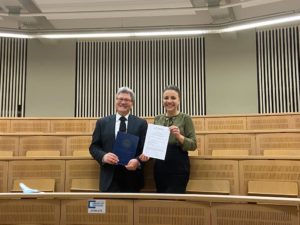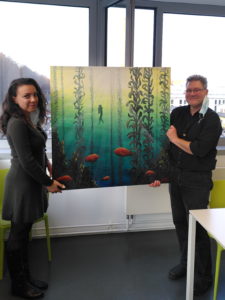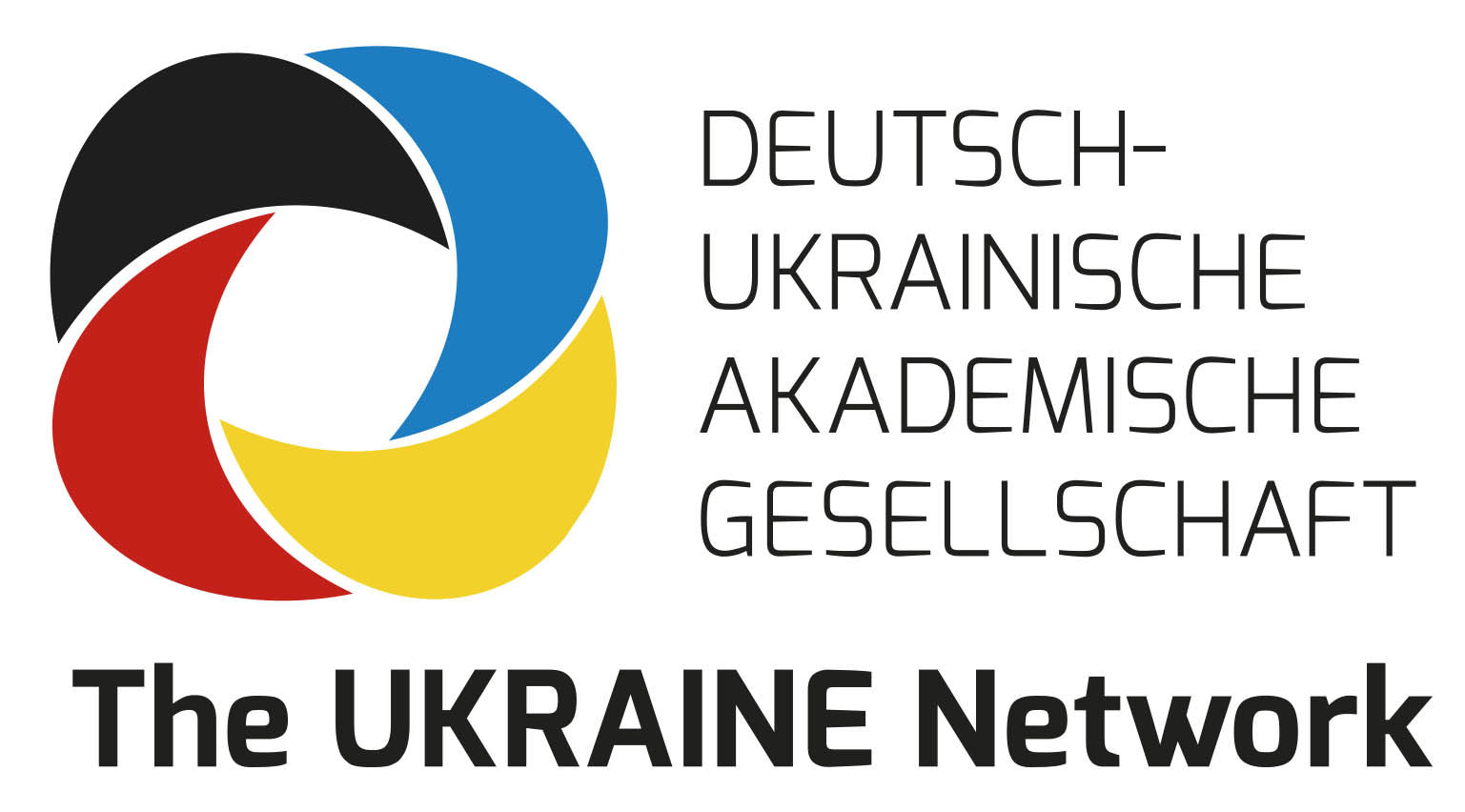By Anna Grebinyk
Dedicated to the memory of my grandfather Vyacheslav Mykhailov, on his 85th Birthday

The year of 2021 will forever stick in my memory – not just as an unprecedented advance of nanotechnology in its rise against the COVID pandemic, but also as the grand finale of my PhD adventure.
My name is Anna Grebinyk and, as a Ukrainian, I am crazy about football. This is why I moved my research to football-friendly Germany in 2015, supported by a DAAD scholarship. Since then, I have been playing “football” against cancer under the supervision of Prof. Dr. Marcus Frohme at the Department of Molecular Biotechnology and Functional Genetics at the Technical University of Applied Sciences Wildau, located near Berlin. Actually, our football is a very special one: it is only 0.72 nm in diameter and is called Buckyball. Football is not just a metaphor here. Sixty carbon atoms form one Buckyball in the exact shape of a football. A non-planar molecular shape of carbon rings bends electrons orbitals and gives Buckyball its unique physico-chemical properties and biological activity, which we steer to efficiently kill cancer cells. The main point is that under simple visible light photoexcited Buckyball generates reactive oxygen species with 100% efficiency. Those highly toxic chemical species cause oxidative damage and lead to compact cell death – apoptosis. In my research I run a two-flank attack. I combine photodynamic therapy and chemotherapy using Buckyball both as a phototoxic anticancer agent and as a nanocarrier for chemotherapeutic drug. Doxorubicin is a model compound as it is a commonly used anti-cancer drug, though we used other drugs as well. I hit cancer cells with the drug-containing Buckyball, where the Buckyball doubles drug uptake. Under visible light a cancer cell is exposed to a double toxic hit from both the photoexcited Buckyball and the co-delivered drug. The cell dies amazingly fast and compact. This combined treatment strategy is 20 times more effective than the drug alone.
For me being a PhD student meant learning how to be persistent in overcoming difficulties and not only those that arise at the laboratory bench, including work-life balance as a working parent. My path to the PhD title was not always straightforward as it might have appeared at the beginning, but reaching the finishing line I proved to myself I deserve to be recognized a scientist. So, early this year, on the Old New Year‘s Eve (the Orthodox New Year, which is an informal traditional holiday, celebrated as the start of the New Year by the Julian calendar), I found myself successfully defending my PhD thesis “Synergistic Chemo- and Photodynamic Treatment of Cancer Cells with C60 Fullerene Nanocomplexes” at the University of Würzburg under the supervision of Prof. Dr. Thomas Dandekar. That was also a challenge in itself, with not only a usual preparation for any question that could possibly be asked, but also because of the COVID pandemic restrictions.
When I first asked my supervisor Prof. Dr. Marcus Frohme on what is required to be awarded the grade of summa cum laude (the highest distinction) for a PhD, he answered frankly that it was impossible. I carried out my research at a University of Applied Sciences, which meant I would need to formally defend my PhD thesis at a partner academic university (more on a rather complicated matter of the right to award academic degrees in Germany could be found e.g. here). Thus, I had to accept that I would be seen as an „external“ student, coming from an area of more applied research. It was not a position from which you can aspire to reach the top grade, given a few times in a year. But I think, even if I had given up at that moment, I had inspired someone else. I never mentioned this idea again, but kept working at my best. I was always eager to learn new techniques and skills, have experiments run up to midnight and during weekends, coach new students, teach the courses, participate in countless meetings and conferences, initiate a few new international cooperations, write and submit a series of different-scale project proposals, win a few of them, publish a dozen of papers, and most importantly – along the way I was falling deeper and deeper in love with science. So, when my supervisor suggested my PhD thesis for an evaluation with the grade of summa cum laude, it came to me as a big and most cherished surprise. Still I consider my publishing activity to be the major joker card in it, which was a direct result of my pro-active position in developing and pursuing new scientific aims and German-Ukrainian cooperations. Thus, I crossed the PhD finish line with 10 published articles in peer-reviewed international journals (including seven as the 1st author). And then, after a complete round of reviews, PhD defense and a round of discussions in person, I received my German PhD in natural sciences with summa cum laude. The dream I did not dare to dream came true!

And here I want to share my gratitude for every help and support that I was lucky to get on my way to the PhD. I consider myself to be indeed a very fortunate person, because I had a chance to learn from my supervisors, collaborators and colleagues and because I got so much support and faith from my family and friends. I spent also a lot of time reflecting on how to express my gratitude to the single most important person in this group – my primary supervisor Prof. Dr. Marcus Frohme. Finally, I came up with a rather unusual idea. Here, with this 1 m2 painting I tried to capture not only his favorite diving spot, but also his exceptional skill to see and spread the light. As light is also a major player in my PhD research, it completes the circle.
And now, I would like to share with you a flash of this light with a few most important personal conclusions from my PhD life:
- Be not only open to new opportunities, but look for them pro-actively. For example, I consider traveling an essential activity to broaden my horizons and build a strong network. As a PhD student I attended six scientific conferences, which were supported by personal travel grant awards. And although the total number of my applications for such travel grants was ten, this is still a pretty high success rate. It also shows that you cannot be always successful. Science communication to both general and specialized audiences has become one of the biggest joys of my work. I always grasp an opportunity to present my results and hold six awards for diverse scientific presentations, including being finalist of the first PhD Thesis Presentation Contest 2016 and the 3rd Speed Lecture Award at the BIONNALE 2019. I like here to quote Edwin Louis Cole, who said: „Winners are not those, who never fail, but those, who never quit“.
- If you already have a Bachelor/Master of Sciences degree, it does not mean, there is nothing to learn. Educational programs could not foresee and cover all the knowledge you might need along in your scientific career. Constantly educate yourself! For example, I found an opportunity to take part in the Academy for Postdoctoral Career Development at the Potsdam Graduate School, the University of Potsdam, where I learnt management skills for research and university. And as for the last few years, the education became even more accessible with a COVID-driven digitalization. There is no shame in not knowing something, but it would be a shame not to learn it.
- Be part of a community. This opens up a bunch of new opportunities to connect with people, reach your goals, get inspiration and support. For example, in addition to different scholarly societies, I joined the German-Ukrainian Academic Society (Die Deutsch-Ukrainische Akademische Gesellschaft, DUAG). Its main goal is fostering cooperation with Ukraine, which is very close to my heart. Since then, I am happy to be involved in our “Communication & Public Relations” working group, where I support the Web and Newsletter publishing and design of the promotion materials (poster, programs, incl. e.g. the PhD Contest logotype, etc.). I had got a chance to participate in the first German-Ukrainian summer school “Perspectives for young scientists in life sciences: Mastering global challenges of the modern society” (25-31 July 2016, Ivano-Frankivsk), organized by the DUAG members and supported by the DAAD. And this year, another big dream of mine came true with the DUAG’s support (special thanks to Dr. Oksana Seumenicht and Dr. Tetyana Yevsa) – I have successfully co-organized two German-Ukrainian DAAD Autumn Schools “Lessons in Biomedicine Learnt from Nanotechnology & Artificial Intelligence” (27 September-1 October 2021, Kharkiv and 4-8 October 2021, Kyiv). Our effort to merge these two innovative fields in an event for young scientists was a real success, fostering scientific cooperations between Germany and Ukraine.
I would also like to speak a word of gratitude to my late grandparents, Dr. Evgenija Mykhailova and Prof. Dr. Vyacheslav Mykhailov, for the curiosity and interest in life sciences I inherited from them. And now, I would like to finish with a special thanks to you, my dear reader, for surviving my long testimonial and wish you to be persistent in following your dreams. We never know where we can stumble. The trick is to make it a part of the dance. Anyway, there is always a great result to be reached or a lesson to be learnt, either way – we move ahead!
